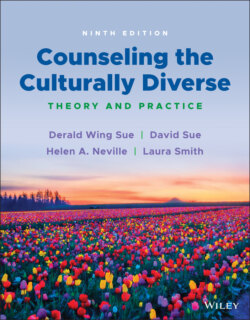Читать книгу Counseling the Culturally Diverse - Laura Smith L. - Страница 60
BOX 2.1 MULTICULTURAL COUNSELING COMPETENCIES
Оглавление1 AwarenessMoved from being culturally unaware to being aware and sensitive to their own cultural heritage and to valuing and respecting differences.Aware of their own values and biases and of how they may affect diverse clients.Comfortable with differences that exist between themselves and their clients in terms of race, gender, sexual orientation, and other social identity variables. Differences are not seen as deviant.Sensitive to circumstances (personal biases; stage of racial, gender, and sexual orientation identity; sociopolitical influences; etc.) that may dictate referral of clients to members of their own social identity group(s) or to different therapists in general.Aware of their own racist, sexist, heterosexist, or other detrimental attitudes, beliefs, and feelings.
2 KnowledgeKnowledgeable and informed on a number of culturally diverse groups, especially groups with whom therapists work.Knowledgeable about the sociopolitical system's operation in the United States with respect to its treatment of marginalized groups in society.Possessing specific knowledge and understanding of the generic characteristics of counseling and therapy.Knowledgeable about the institutional barriers that prevent some diverse clients from using mental health services.
3 SkillsAble to generate a wide variety of verbal and nonverbal helping responses.Able to communicate (send and receive both verbal and nonverbal messages) accurately and appropriately.Able to exercise institutional intervention skills on behalf of clients, when appropriate.Able to anticipate the impact of one's helping styles and of their limitations on culturally diverse clients.Able to play helping roles characterized by an active systemic focus, which leads to environmental interventions. Not restricted by the conventional counselor/therapist mode of operation.
Sources: Sue et al. (1992, 1998). Readers are encouraged to review the original 34 multicultural competencies, which are fully elaborated in both publications.
Second, cultural competence can be seen as residing in three major domains: (a) attitudes/beliefs component—an understanding of one's own cultural conditioning and how this conditioning affects the personal beliefs, values, and attitudes of a culturally diverse population; (b) knowledge component—understanding and knowledge of the worldviews and cultural contexts of culturally diverse individuals and groups; and (c) skills component—an ability to determine and use culturally appropriate intervention strategies when working with different groups in our society. Cultural humility is a key component of cultural competence, as it serves as the conduit in which awareness, knowledge, and skills are expressed. Box 2.1 provides an outline of cultural competencies related to the three major domains.
Third, in a broad sense, this definition is directed toward two levels of cultural competence: the personal/individual and the organizational/system levels. The work on cultural competence has generally focused on the micro level: the individual. In the education and training of psychologists, for example, the goals have been to increase the level of self‐awareness of trainees (potential biases, values, and assumptions about human behavior); to impart knowledge of the history, culture, and life experiences of various minority groups; and to aid in developing culturally appropriate and adaptive interpersonal skills (clinical work, management, conflict resolution, etc.). Less emphasis is placed on the macro level: the profession of psychology, organizations, and the society in general (Desai et al., 2021). We suggest that it does little good to train culturally competent helping professionals when the very organizations that employ them are monocultural and discourage or even punish psychologists for using their culturally competent knowledge and skills. If our profession is interested in the development of cultural competence, then it must become involved in impacting systemic and societal levels as well.
Fourth, our definition of cultural competence speaks strongly to the development of alternative helping roles. Much of this comes from recasting healing as involving more than one‐to‐one therapy. If part of cultural competence involves systemic intervention, then such roles as consultant, change agent, teacher, and advocate supplement the conventional role of therapy. In contrast to this role, alternatives are characterized by the following:
Having a more active helping style
Working outside the office (home, institution, or community)
Being focused on changing environmental conditions, as opposed to changing the client
Viewing the client as encountering problems rather than as having a problem
Being oriented toward prevention rather than remediation
Shouldering increased responsibility for determining the course and the outcome of the helping process
It is clear that these alternative roles and their underlying assumptions and practices have not been historically perceived as activities consistent with counseling and psychotherapy.
